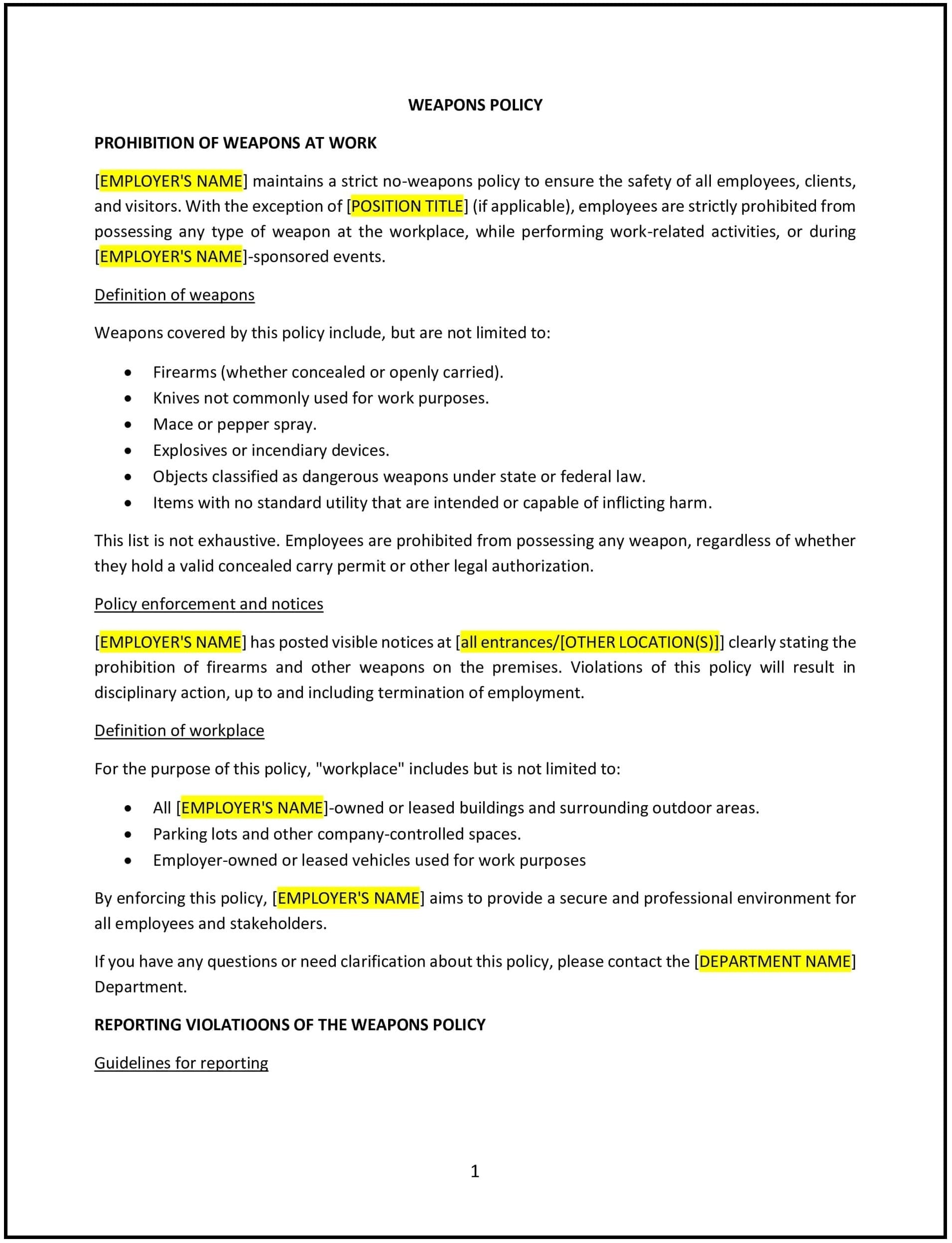Got contracts to review? While you're here for policies, let Cobrief make contract review effortless—start your free review now.

Customize this template for free
This weapons policy is designed to help Massachusetts businesses ensure a safe and secure work environment by addressing the presence and use of weapons on company premises. The policy outlines the company’s stance on weapons, specifies where and when weapons are prohibited, and clarifies the steps employees should take if they encounter or observe weapons in the workplace. The policy helps prevent workplace violence, maintain employee safety, and minimize risks associated with the possession or use of weapons in the workplace.
By adopting this policy, businesses can protect their employees, property, and reputation while promoting a respectful and safe workplace for all.
How to use this weapons policy (Massachusetts)
- Define weapons: Clearly define what constitutes a weapon under the policy. This includes firearms, knives, explosives, and any other objects that can be used to inflict harm. The policy should specify that all weapons, including those carried legally, are prohibited in the workplace unless expressly authorized by law or the company.
- Set prohibited areas: Outline the areas where weapons are prohibited, such as company premises, vehicles, or events hosted by the company. The policy should also specify whether weapons are allowed in parking lots or other areas outside of the primary workplace.
- Address exceptions: If there are any exceptions to the prohibition on weapons, such as law enforcement personnel or individuals who have been expressly authorized to carry a weapon as part of their job, these exceptions should be clearly outlined in the policy.
- Provide procedures for reporting weapons: Employees should be informed about how to report the presence of weapons in the workplace. The policy should include a clear and confidential process for reporting suspected or actual incidents involving weapons.
- Set consequences for policy violations: The policy should outline the consequences for violating the weapons policy. This may include disciplinary actions ranging from warnings to termination, depending on the severity of the violation.
- Ensure compliance with Massachusetts and federal laws: The policy should comply with Massachusetts state laws and federal regulations regarding weapons in the workplace, including any applicable exceptions for law enforcement officers, licensed security personnel, or other authorized individuals.
- Review and update regularly: Periodically review and update the policy to ensure it is compliant with changes in Massachusetts state laws, federal regulations, and any changes in the company’s operations or workplace security needs.
Benefits of using this weapons policy (Massachusetts)
This policy offers several benefits for Massachusetts businesses:
- Promotes a safe and secure work environment: By clearly prohibiting weapons in the workplace, businesses help prevent potential incidents of violence and promote employee safety.
- Reduces legal risks: By supporting compliance with Massachusetts state laws and federal regulations, businesses reduce the risk of legal action related to weapons possession or use in the workplace.
- Enhances employee peace of mind: Employees are more likely to feel safe and secure in the workplace when they know that weapons are prohibited and that the company is taking proactive steps to maintain a secure environment.
- Improves workplace culture: A clear weapons policy helps maintain a respectful and professional work environment by minimizing the risk of conflicts or violence caused by the presence of weapons.
- Strengthens organizational reputation: A strong commitment to workplace safety enhances the company’s reputation as a responsible employer, which can improve employee retention and attract top talent.
- Supports workplace safety initiatives: The policy supports broader workplace safety efforts, including emergency response planning and conflict resolution programs, by addressing one of the primary risks to employee safety in the workplace.
Tips for using this weapons policy (Massachusetts)
- Communicate the policy clearly: Ensure that all employees are aware of the weapons policy and understand the company’s stance on the presence of weapons in the workplace. Include the policy in the employee handbook and review it during onboarding or regular training sessions.
- Train employees on reporting procedures: Provide employees with training on how to report weapons-related concerns and how to respond if they encounter a weapon in the workplace. This includes knowing who to contact and how to ensure their own safety.
- Enforce the policy consistently: Ensure that the policy is consistently enforced across all levels of the organization. This includes taking appropriate action in response to violations and ensuring that employees feel safe reporting any issues related to weapons.
- Provide support for employees affected by weapon-related incidents: In the event that a weapon-related incident occurs, provide support services such as counseling or access to Employee Assistance Programs (EAPs) for employees who may be impacted by the event.
- Review and update regularly: Periodically review the policy to ensure it is compliant with Massachusetts state laws, federal regulations, and any changes in the company’s operations or security needs. Update the policy as needed to maintain a safe and secure work environment.